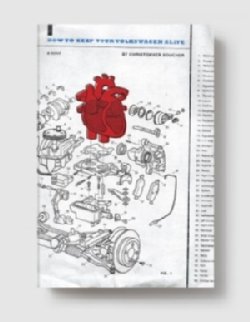Spring 2012 Raymond Carver Reading Series: Volkswagens as metaphor for life
Syracuse University alumnus Christopher Boucher G'02 will read from "How to Keep your Volkswagen Alive"

The Spring 2012 Raymond Carver Reading Series will continue on March 7 with Syracuse University alumnus Christopher Boucher G’02, author of the novel How to Keep your Volkswagen Alive (Melville House, 2011), at 5:30 p.m. in Huntington Beard Crouse (HBC) Gifford Auditorium. The reading will be preceded by a question and answer session from 3:45 to 4:30 p.m. The event is free and open to the public. Parking is available in SU’s paid lots.
How to Keep Your Volkswagen Alive is a story about a newspaper reporter living in Western Massachusetts trying to raise his son—a 1971 Volkswagen Beetle. A work of fiction mimicking real-life, the publisher describes the novel as “a zany literary universe, a place where metaphors shift beneath your feet, familiar words assume new meanings, objects talk, trees attack, and time actually is money. Modeled on the cult classic 1969 hippie handbook of the same name, How To Keep Your Volkswagen Alive is an astonishing tour-de-force that tackles some of life’s biggest questions: How do you cope with losing a parent? What’s the secret to raising a child? How do you keep love alive? How do you get your car to start?”
Boucher wrote an early draft of Volkswagen while a student in the Creative Writing Program in SU’s College of Arts and Sciences. As a child, Boucher drove around in his father’s Volkswagen bus and watched a friend’s VW bus catch fire in the family driveway. He drove a 1984 Volkswagen Rabbit during his undergraduate days at Brandeis University, from which he graduated in 1997, and a 1971 Super Beetle when he worked as a newspaper reporter for The Daily Hampshire Gazette. He currently teaches writing and literature at Boston College and is managing editor of Post Road Magazine.
Boucher intended to drive from Los Angeles to Boston during the summer of 2011 in a 1972 Beetle when he was on tour for his book. He purchased the car in L.A., the first stop on the tour, site unseen after talking by phone with the owner. While the car was exactly as described, it developed a gas leak while Boucher and his wife were driving it around the city. They were due in San Francisco the next day for a 7 p.m. reading. Turns out repairs could not be made in time. “We faced a difficult decision: wait for the Bug to be fixed and miss the reading in San Francisco, or travel on without it,” Boucher wrote in an email. “I called the owner and explained the situation, and he was very understanding. We sold him back the car and ended up making the (cross-country) trip in a rental car.”
How to Keep Your Volkswagen Alive is a story about a newspaper reporter living in Western Massachusetts trying to raise his son—a 1971 Volkswagen Beetle. A work of fiction mimicking real-life, the publisher describes the novel as “a zany literary universe, a place where metaphors shift beneath your feet, familiar words assume new meanings, objects talk, trees attack, and time actually is money. Modeled on the cult classic 1969 hippie handbook of the same name, How To Keep Your Volkswagen Alive is an astonishing tour-de-force that tackles some of life’s biggest questions: How do you cope with losing a parent? What’s the secret to raising a child? How do you keep love alive? How do you get your car to start?”
Boucher wrote an early draft of Volkswagen while a student in the Creative Writing Program in SU’s College of Arts and Sciences. As a child, Boucher drove around in his father’s Volkswagen bus and watched a friend’s VW bus catch fire in the family driveway. He drove a 1984 Volkswagen Rabbit during his undergraduate days at Brandeis University, from which he graduated in 1997, and a 1971 Super Beetle when he worked as a newspaper reporter for The Daily Hampshire Gazette. He currently teaches writing and literature at Boston College and is managing editor of Post Road Magazine.
Boucher intended to drive from Los Angeles to Boston during the summer of 2011 in a 1972 Beetle when he was on tour for his book. He purchased the car in L.A., the first stop on the tour, site unseen after talking by phone with the owner. While the car was exactly as described, it developed a gas leak while Boucher and his wife were driving it around the city. They were due in San Francisco the next day for a 7 p.m. reading. Turns out repairs could not be made in time. “We faced a difficult decision: wait for the Bug to be fixed and miss the reading in San Francisco, or travel on without it,” Boucher wrote in an email. “I called the owner and explained the situation, and he was very understanding. We sold him back the car and ended up making the (cross-country) trip in a rental car.”

Named for the great short story writer and poet who taught at SU in the 1980s, the Raymond Carver Reading Series is a vital part of Syracuse’s literary life. Presented by the Creative Writing Program, the series each year brings 12 to 14 prominent writers to campus to read their works and interact with students.
Spring 2012 Series Schedule
The Series will continue with the following authors. All readings begin at 5:30 p.m. in HBC Gifford Auditorium. Question and Answer sessions are from 3:45 to 4:30 p.m. Further information is available by calling (315) 443-2174.
March 21: Ben Marcus, author of The Flame Alphabet (Knoph, 2012) and Notable American Women (Vintage, 2002) and associate professor in Columbia University’s School of the Arts. Marcus is the Creative Writing Program’s 2012 Richard Elman Visiting Writer.
April 4: Jay Rogoff, author of The Art of Gravity (Louisiana State University Press, 2011) and a lecturer at Skidmore College.
April 25: Kelle Groom, author of I Wore the Ocean in the Shape of a Girl (Free Press/Simon & Schuster, 2011) and contributing editor for The Florida Review.
Spring 2012 Series Schedule
The Series will continue with the following authors. All readings begin at 5:30 p.m. in HBC Gifford Auditorium. Question and Answer sessions are from 3:45 to 4:30 p.m. Further information is available by calling (315) 443-2174.
March 21: Ben Marcus, author of The Flame Alphabet (Knoph, 2012) and Notable American Women (Vintage, 2002) and associate professor in Columbia University’s School of the Arts. Marcus is the Creative Writing Program’s 2012 Richard Elman Visiting Writer.
April 4: Jay Rogoff, author of The Art of Gravity (Louisiana State University Press, 2011) and a lecturer at Skidmore College.
April 25: Kelle Groom, author of I Wore the Ocean in the Shape of a Girl (Free Press/Simon & Schuster, 2011) and contributing editor for The Florida Review.
Media Contact
Judy Holmes
